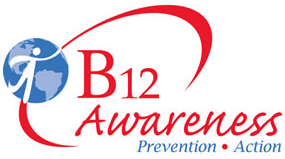Why it’s Misdiagnosed
Why Is B12 Deficiency So Frequently Misdiagnosed?
- Most doctors and health care providers don’t know the facts about B12 deficiency.
- Most patients who have B12 deficiency symptoms or are at risk for B12 deficiency never get tested.
- The current standard for “normal” serum B12 levels is actually far too low.
- Doctors frequently don’t diagnose B12 deficiency until the patient has enlarged red blood cells and/or macrocytic anemia—which are often late signs of advanced B12 deficiency.
- People over 65 are frequently misdiagnosed because doctors blame their B12 deficiency symptoms on preexisting diseases and comorbid conditions.
- The current Daily Required Intake (DRI) and Recommended Daily Allowance (RDA) for B12 health for adults, during pregnancy, and during child growth and development are grossly outdated.
B12 screening is not included for:
- Older adults who fall or are at risk for falling.
- Older adults who have cognitive changes or dementia.
- Patients presenting depression or mental illness.
- Patients who are pregnant or breastfeeding.
More on B12 Deficiency
B12 deficiency causes symptoms such as nerve pain or tingling, dementia, mental illness, tremor and difficulty walking. It is commonly misdiagnosed as Alzheimer’s disease, depression, diabetic neuropathy, vertigo and mini—strokes. Major medical journals report that vitamin B12 deficiency occurs in up to 15 percent of the elderly—approximately 5.9 million seniors age 65 and older. Other studies report the prevalence to be 15 percent to 25 percent.
What’s more, these numbers only relate to persons 65 and older. They don’t include the vast numbers of Americans under the age of 65—some of them infants and children, and millions of them young and middle—aged adults—who become B12 deficient for a variety of reasons. Treating B12 deficiency costs only a few dollars a month—just 10 cents a day—and symptoms are often completely reversible if people receive early treatment. If diagnosed late, symptoms such as dementia and nerve injury typically cannot be reversed.
B12 deficiency can mimic multiple sclerosis, chronic fatigue syndrome and postpartum depression/psychosis. It can make men or women infertile and cause developmental disabilities or autistic—like symptoms in children. Other groups of people at high risk for B12 deficiency include vegans, vegetarians, alcoholics and people with celiac disease, Crohn’s disease, gastric bypass, anemia, autoimmune diseases and AIDS. The use of certain drugs such as proton pump inhibitors, metformin, H—2 blockers and nitrous oxide can also cause B12 deficiency.
